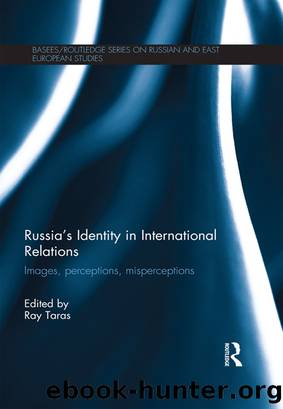Russia's Identity in International Relations by Raymond Taras

Author:Raymond Taras [Taras, Raymond]
Language: eng
Format: epub
ISBN: 9781138816787
Barnesnoble:
Publisher: Taylor & Francis
Published: 2014-08-15T00:00:00+00:00
Putin's innovations on collective identity
In Putin's addresses representation of Russia as similar and equal to other âpowerful, economically advanced and influential states of the worldâ is the major frame for collective self-identification vis-Ã -vis âthe Westâ. It constitutes his major innovation when compared to the models of collective identity that dominated Russian public discourse in the 1990s. The idea of Russia's similarity to its Significant Other traditionally employed the metaphor of pupilhood: multiple variants of âWesternismâ explained the differences between Russia and âthe other Europeâ by invoking its supposed backwardness. They tended to represent it as a âyoungâ and âtalented pupilâ who succeeds quickly. This metaphor allows Russia to be fixed not only in terms of similarity (its âsuccessâ), but also differences (its âbackwardnessâ).
It is significant that Putin's addresses refer to both aspects of this metaphor. On the one hand, he records the fact that the distance between Us and the Other has been cut: progress in integration into the world economy (Putin 2001, 2002), status of âfull-fledged member of the Club of Eight made up of the most advanced states in the worldâ (Putin 2003), and so on. On the other hand, Putin critically acknowledges differences that do not yet allow Russia to be equated with the âadvanced statesâ: the existence of an economic lag that âpushes Russia down to the level of third world countriesâ (Putin 2000), and the need to overcome this lag (Putin 2002). Though such statements are uncommon, the descriptive terms used for comparisons between Russia and its Other emphasize the relative character of these differences.
Still, the metaphor of âpupilhoodâ implies a hidden trap. As Iver Neumann has argued, the notion of Russia as pupil supposes that it increasingly becomes more similar to Us and simultaneously develops into less âotherâ (Neumann 1999: 107). If that is the case, then the question arises how long distinctions may continue to be viewed as constitutive traits. As Neumann persuasively demonstrates, the discourse of European identity holds differences between Europe and Russia to be temporal rather than spatial. That is, Russia is seen as a country that is always at a certain stage of Europeanization (Neumann 1999: 111). When needed, discourse redefines the context in order to maintain this image of Russia. It is important to ask, then, whether such an approach fits the strategy of Russia itself?
The model of collective self-identification constructed in the speeches of Putin suggests a categorically negative answer to this question. Its central aspect is the claim for actual (not only potential) similarity between Russia and âthe most advanced states in the worldâ. In Putin's addresses this claim was substantiated not only by referring to recent achievements â membership in the G-8, significant economic development, etc. â and cooperation in an anti-terrorist coalition. He also iterated the European identity of Russia (Putin 2005), recognition of âour contribution to the development of an all-European and world cultureâ (Putin 2007b), and emphasis on the âcivilizational missionâ of Russia âon the Euro-Asian continentâ (Putin 2005). Furthermore, Putin highlighted how the problems that Russia faces today are familiar to other countries (Putin 2000, 2006).
Download
This site does not store any files on its server. We only index and link to content provided by other sites. Please contact the content providers to delete copyright contents if any and email us, we'll remove relevant links or contents immediately.
Collaborating with Parents for Early School Success : The Achieving-Behaving-Caring Program by Stephanie H. McConaughy; Pam Kay; Julie A. Welkowitz; Kim Hewitt; Martha D. Fitzgerald(917)
Entrepreneurship Education and Training: The Issue of Effectiveness by Colette Henry Frances Hill Claire Leitch(684)
Materializing the Middle Passage by Jane Webster;(513)
Adding Value to Policy Analysis and Advice by Claudia Scott; Karen Baehler(500)
Race and American Political Development by unknow(493)
Sociological Perspectives of Health and Illness by Constantinos N. Phellas(493)
American Government and Politics Today by Steffen W. Schmidt Mack C. Shelley Barbara A. Bardes(488)
Human and Global Security : An Exploration of Terms by Peter Stoett(479)
Control Of Oil - Hardback by Kayal(476)
The Disappearance of Rituals: A Topology of the Present by Byung-Chul Han(422)
The Catholic Church and European State Formation, AD 1000-1500 by Jørgen Møller(406)
Advances in Child Development and Behavior, Volume 37 by Patricia J. Bauer(405)
The World According to China by Elizabeth C. Economy(391)
Theories of Counseling and Psychotherapy: A Case Approach by Nancy L. Murdock(383)
Application of classical statistics, logratio transformation and multifractal approaches to delineate geochemical anomalies in the Zarshuran gold district, NW Iran by unknow(377)
Left Is Not Woke by Susan Neiman(373)
Cross-Cultural Child Development for Social Workers by Lena Robinson(361)
Turkey's Relations with the West and the Turkic Republics: The Rise and Fall of the Turkish Model by Idris Bal(357)
Japan's Ainu Minority in Tokyo by Mark K. Watson(346)
